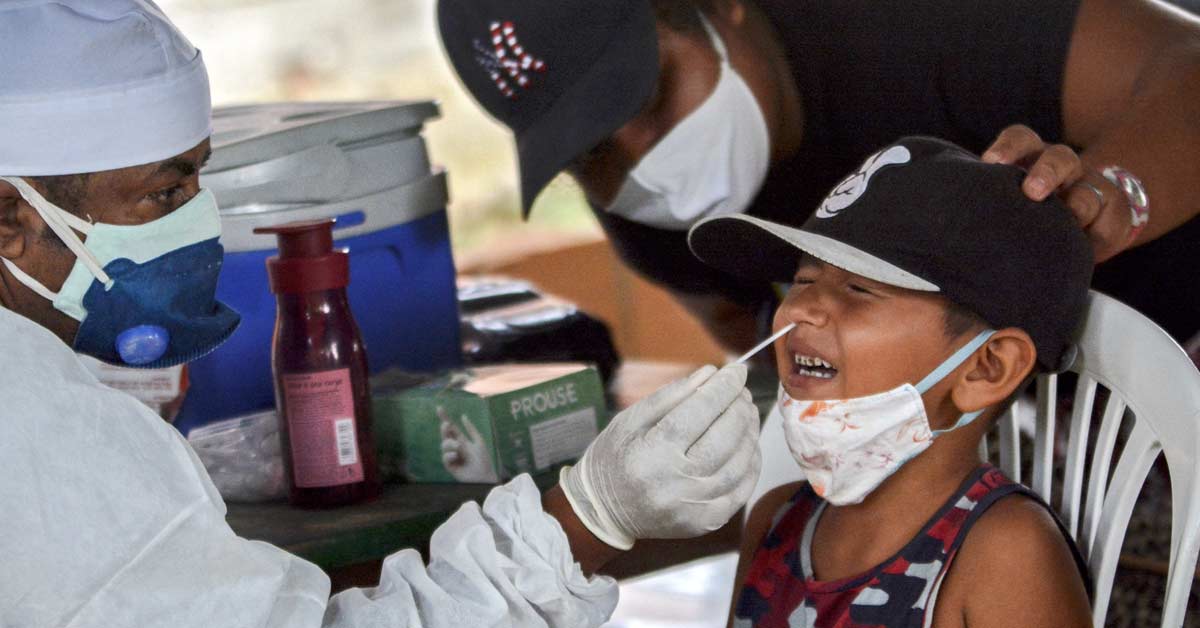More than a year into the pandemic, deaths in Brazil are now at their peak. But despite the overwhelming evidence that COVID-19 rarely kills young children, in Brazil 1,300 babies have died from the virus.
One doctor refused to test Jessika Ricarte's one-year-old son for COVID, saying his symptoms did not fit the profile of the virus. Two months later he died of complications from the disease.
She first suspected something was wrong when Lucas, always a good eater, lost his appetite.
At first Jessika wondered if he was teething. But after he developed a fever, then fatigue and slightly laboured breathing, Jessika took him to hospital, and asked for him to be tested for COVID.
"The doctor put on the oximeter. Lucas's levels were 86 percent. Now I know that is not normal," says Jessika.
But he was not feverish, so the doctor said: "My dear, don't worry. There's no need for a COVID test. It's probably just a minor sore throat."
He told Jessika that COVID-19 was rare in children, gave her some antibiotics and sent her home. Despite her misgivings, there was no option to have Lucas tested privately at the time.
Jessika says that some of his symptoms dissipated at the end of his 10-day antibiotics course, but the tiredness remained – as did her concerns about coronavirus.
"I sent several videos to his godmother, my parents, my mother-in-law, and everyone said that I was exaggerating, that I should stop watching the news, that it was making me paranoid. But I knew that my son was not himself, that he was not breathing normally."
The weeks went by, and Lucas became sleepier and sleepier. Finally on 3 June, Lucas vomited over and over again after eating lunch, and Jessika knew she had to act.
They returned to their local hospital, where the doctor tested Lucas for COVID, to rule it out.
Lucas's godmother, who worked there, broke the news to the couple that his test results was positive.
Lucas was transferred to a paediatric intensive care unit in Sobral, over two hours away, where he was diagnosed with a condition called multi-system inflammatory syndrome (MIS).
This is an extreme immune response to the virus, which can cause inflammation of vital organs.
Manuela Monte, the paediatric doctor who treated Lucas for over a month in the ICU in Sobral, said she was surprised that Lucas's condition was so serious, because he did not have any risk factors.
Most children affected by COVID have comorbidities – existing conditions such as diabetes or cardiovascular disease – or are overweight, according to Lohanna Tavares, a paediatric infectologist at Albert Sabin Children's Hospital in Fortaleza, the state capital.
But that wasn't the case with Lucas.
During the 33 days Lucas was in the ICU, Jessika was only allowed to see him three times. Lucas needed immunoglobulin to deflate his heart. Lucas was so ill that he went on to receive a second dose of immunoglobulin. He needed support to breathe.
Then Lucas began to improve and the doctors decided to take out his oxygen tube. They video-called Jessika and Israel so that he wouldn't feel alone as he regained consciousness.
It was the last time they were to see their boy react. During the next video call "he had a paralysed look". The hospital requested a CT scan and discovered Lucas had had a stroke.
Still, the couple were told Lucas would make a good recovery with the right care and would soon be moved out of ICU and into a general ward.
When Jessika and Israel went to visit him, the doctor was just as hopeful as they were, she says.
"That night, I put my cell phone on silent. I dreamed Lucas came up to me and kissed my nose. And the dream was a great feeling of love, gratitude and I woke up very happy. Then I saw my cell phone and saw the 10 calls that the doctor had made."
The doctor told Jessika that Lucas's heart rate and oxygen levels had dropped suddenly, and he had died early that morning.
She feels sure that if Lucas had been given a COVID test when she had requested it back in early May, he would have survived.
"It is important that doctors, even if they believe it is not COVID, do the test to eliminate the possibility," she said.
There is a misconception that children are at zero risk for COVID, says Fatima Marinho, who is a senior adviser to the international health NGO Vital Strategies.
Between February 2020 and 15 March 2021, COVID-19 killed at least 852 of Brazil's children up to the age of nine, including 518 babies under one year old. But Marinho estimates that more than twice this number of children have died of COVID. A serious problem of underreporting due to lack of COVID testing is bringing the numbers down, she says.
Marinho calculated the excess of deaths by unspecified acute respiratory syndrome during the pandemic, and found that there were 10 times more deaths by unexplained respiratory syndrome than in previous years. By adding these numbers, she estimates that the virus in fact killed 2,060 children under nine years old, including 1,302 babies. – BBC
Related Articles:
